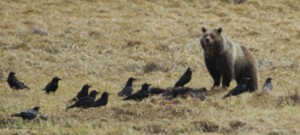I’m feeling hopeful after an invigorating Nemawashi/gathering with a small group of grizzly bear advocates here in Bozeman, Montana, earlier this week. I was humbled by the invite and both inspired and uplifted after spending two hours in the presence of brilliant minds, passionate souls, and audacious guardians led by the matriarch of modern day grizzly bear advocacy here in the Northern Rockies, Louisa Wilcox. Looking around the room rich with PhD biologists I asked our fearless leader why I was included on the invite list, to which she answered, “Because we have plenty of science. But we need heart and you are all heart, Michael.” Spending two hours with the one and only Charlie Russell—a pioneer in the world of bear conservation, with a heart full of love—sitting beside a woman I’ve long admired, talking bears, was a cherished experience I won’t soon forget.
Two days later and I‘m still all fired up from this gathering with the AUDACIOUS Charlie Russell and cadre of bear activists. What an honor to sit with this legendary bear whisperer for two hours and share our hopes for the ursa family. Charlie Russell’s research on Kamchatka demonstrates the true nature of bears. Far from unpredictable, as they are most often depicted, Charlie Russell has shed light on what I discovered as a bear education ranger managing bear jams in Yellowstone: bears aren’t the unpredictable and vicious species they are reputed to be. More often they are tolerant of people & predictable in behavior. Reverent, audacious, intentional & always authentic, Charlie Russell is a champion of these bears that capture his heart.
But this meeting inspired me to take a deeper look at a question that plagues me on a daily basis here on the fringe of wild country, on the northern reaches of the Greater Yellowstone, in Bozeman, Montana—where the housing boom relentlessly dismantles habitat at an alarming clip. At what point will our society be empathetic towards the plight of other species? When is enough enough? After 39 years listed as a threatened species under the Endangered Species Act, local agencies want to “harvest”—i.e., kill—grizzly bears in ID, WY, and MT.
Is nothing—no place, no living creature—sacred anymore? If not Yellowstone Country and the southern most population of grizzlies in the lower 48, I’m not sure what is. It is abundantly clear that we need a dramatic shift in narrative regarding our wild world, something Louisa Wilcox of the Center for Biological Diversity speaks of eloquently. A narrative of love, reverence and sacredness must become the norm if we hope to leave future generations a verdant, just and wild world.
And speaking of narrative, if when I, as a fishing guide in the process of releasing a fish, kill it, I kill it with a heavy heart, deep reverence and a prayer to the waters. But when someone shoots a bear, mountain lion or wolf, it is considered a “harvest?” How absurd is this attempt to desensitize us from the reality?
Perhaps the first step in developing a new and more reverent narrative is to simply tell it as it is. Our planet is in peril. Wild places are facing unprecedented threats with population explosion and a rapidly changing climate; wildlife habitat continues to shrink as their travel corridors bottleneck to the point of choking off migratory pathways. May we honor our wild world by gracefully accepting our moral and ethical responsibility as guardians of places like Yellowstone Country. For in the end, without a change in narrative, a meaningful land ethic will cease to exist.
For a wild world and a wilder Yellowstone,
~Michael W. Leach


It sounds like you had an incredible experience! You make your points with such clarity and continue to inspire me (and everyone else I’m sure.) Thank you for your well-reasoned and heartfelt words.